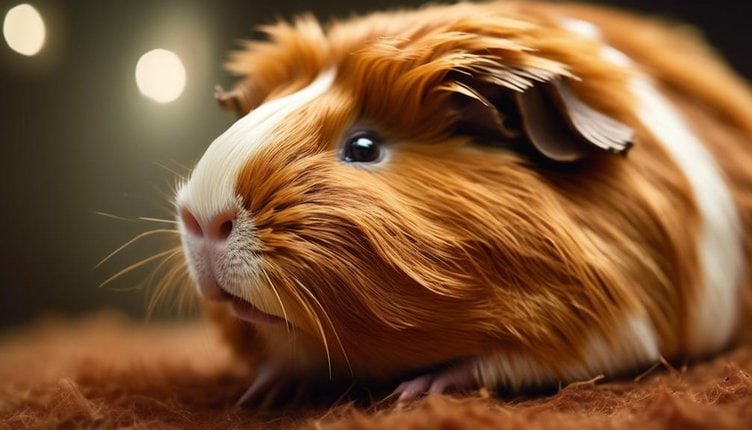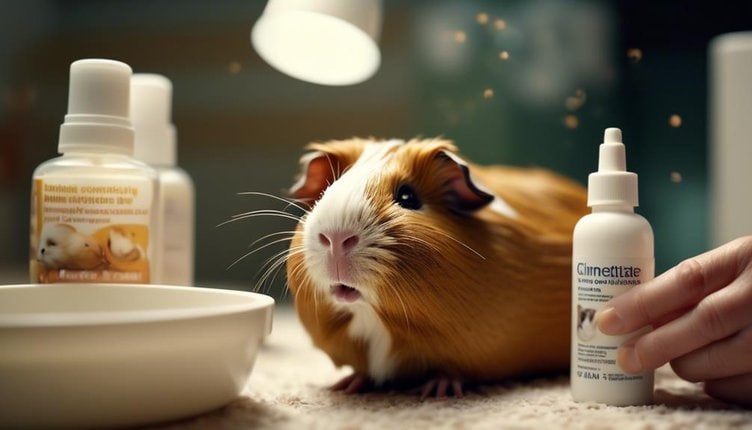Hey there, guinea pig lovers! Are you ready to dive into the fascinating world of fungal infections in these adorable little creatures? Well, get ready because I'm about to blow your mind with some crucial information.
So, picture this: you're cuddling with your fluffy guinea pig, enjoying those cute squeaks, when suddenly you realize that your furry friend might be susceptible to fungal infections. Yeah, I know, it's a bummer. But don't worry, because I'm here to guide you through it all.
We're going to uncover the different types of fungal infections that can plague guinea pigs. From the dreaded ringworm to the menacing aspergillosis, these infections can wreak havoc on your pet's body. And guess what? It's not just discomfort we're talking about here – these infections can lead to serious health issues. Yikes!
But don't panic just yet. We're going to explore the causes and risk factors behind these infections. Knowledge is power, my friends, and understanding what puts your guinea pig at risk will help you take preventive measures. Plus, it'll make you sound super smart at the next guinea pig owner's meeting.
Now, let's talk symptoms and signs. How do you know if your little buddy is dealing with a fungal infection? Well, fear not, because I'm going to break it down for you. We'll discuss all the red flags to look out for, so you can catch those infections early and save your guinea pig from unnecessary suffering.
But wait, there's more! We'll also delve into the diagnostic tests available. Because, let's face it, you're not a guinea pig doctor (unless you secretly are, in which case, cool!). So, I'll give you the lowdown on the tests your vet might use to confirm those pesky fungal infections.
Now, let's get to the good stuff – treatment options. We'll explore all the ways you can help your furry friend overcome these infections. From medications to topical treatments, we'll cover it all. And don't worry, I'll make sure to explain everything in a way that even a guinea pig could understand.
Last but not least, we'll discuss prevention. Because, let's be real, nobody wants their guinea pig to go through the pain of a fungal infection. So, I'll give you some valuable tips to keep those infections at bay. We're talking cleanliness, hygiene, and all that good stuff.
So, whether you're a seasoned guinea pig owner or thinking about bringing one into your home, get ready to become an expert on fungal infections in these adorable creatures. Trust me, you won't want to miss out on this knowledge. Let's do this!
Key Takeaways
- Fungal infections in guinea pigs can be caused by different types of fungi, including Trichophyton mentagrophytes, Aspergillus, and Candida.
- These infections can affect various parts of the guinea pig's body, such as the skin, respiratory system, and gastrointestinal tract.
- Prevention measures, including maintaining good hygiene practices, a balanced diet, and minimizing contact with infected animals, can help reduce the risk of fungal infections.
- Proper diagnosis and treatment, under the guidance of a veterinarian, are crucial for effectively managing fungal infections in guinea pigs.
Types of Fungal Infections
What are the different types of fungal infections that can affect guinea pigs?
Guinea pigs are susceptible to various types of fungal infections, including ringworm, aspergillosis, and candidiasis.
Ringworm is a common fungal infection caused by the organism Trichophyton mentagrophytes. It typically presents as circular, scaly patches on the skin, and can be transmitted from infected animals or contaminated environments. Treatment options for ringworm in guinea pigs include topical antifungal creams containing miconazole or clotrimazole, as well as oral medications like griseofulvin.
Another fungal infection that can affect guinea pigs is aspergillosis, caused by the fungus Aspergillus. This infection primarily affects the respiratory system, leading to symptoms such as coughing, difficulty breathing, and nasal discharge. Treatment options for aspergillosis include antifungal medications such as itraconazole or voriconazole, as well as supportive care to alleviate respiratory symptoms.
Candidiasis, caused by the yeast Candida, is also seen in guinea pigs. It commonly affects the gastrointestinal tract, leading to symptoms like diarrhea, weight loss, and bloating. Treatment options for candidiasis include antifungal medications such as fluconazole or nystatin, as well as dietary changes to promote a healthy gut flora.
Causes and Risk Factors
Guinea pigs, being susceptible to various types of fungal infections, have specific causes and risk factors associated with these conditions. Understanding these factors can help guinea pig owners take preventive measures and seek appropriate treatment options.
Here are the main causes and risk factors of fungal infections in guinea pigs:
- Poor hygiene: Inadequate cleaning of cages and bedding can create a favorable environment for fungal growth. Regularly cleaning and disinfecting the guinea pig's living space is essential to prevent infections.
- Weakened immune system: Guinea pigs with weak immune systems are more prone to fungal infections. Factors that can compromise their immune system include stress, malnutrition, and underlying health conditions.
- Contact with infected animals: Direct contact with other animals, especially those carrying fungal infections, increases the risk of transmission. It's advisable to keep guinea pigs away from infected animals to prevent the spread of fungi.
- Moisture and humidity: Fungi thrive in damp environments. Guinea pigs living in humid conditions or in areas with poor ventilation are more likely to develop fungal infections. Maintaining a dry and well-ventilated living space for guinea pigs is crucial.
To prevent fungal infections, guinea pig owners should focus on maintaining good hygiene practices, ensuring the guinea pig's immune system is strong through a balanced diet, and minimizing contact with infected animals. In case of infection, prompt treatment options such as antifungal medications prescribed by a veterinarian should be sought to ensure the well-being of the guinea pig.
Recognizing Symptoms and Signs

Recognizing symptoms and signs of guinea pig fungal infections is crucial for timely diagnosis and treatment. Visible skin abnormalities are commonly observed, such as hair loss, redness, swelling, or scabs on the skin.
Additionally, behavioral changes may occur, including increased scratching, excessive grooming, or a decrease in appetite.
Being vigilant about these symptoms can help guinea pig owners identify and address fungal infections promptly, ensuring the well-being of their pets.
Visible Skin Abnormalities
Visible skin abnormalities are a key indicator for detecting fungal infections in guinea pigs. These abnormalities can manifest in various ways, providing valuable clues for diagnosis and treatment. To help guinea pig owners recognize these signs, here are some common visible skin abnormalities associated with fungal infections:
- Hair Loss: Fungal infections often cause patchy or generalized hair loss in guinea pigs. Affected areas may appear bald, scaly, or crusty.
- Redness and Irritation: Infected skin may become red, inflamed, and itchy. Guinea pigs may scratch or bite at the affected areas, leading to further irritation and potential secondary infections.
- Lesions and Sores: Fungal infections can cause the development of raised or ulcerated lesions on the skin. These may be accompanied by discharge or crusting.
- Thickened or Flaky Skin: Affected skin may become thickened, rough, or scaly. Flaking and peeling of the skin can also be observed.
While home remedies for skin abnormalities may be tempting, it's essential to seek veterinary care for proper diagnosis and treatment.
Behavioral Changes
After observing visible skin abnormalities associated with fungal infections in guinea pigs, it's important to now explore the behavioral changes that can indicate the presence of this condition.
Guinea pigs experiencing a fungal infection may exhibit signs of stress, such as increased vocalization, decreased appetite, and changes in their usual activity level. They may also show signs of discomfort, such as scratching or rubbing their affected areas excessively. Additionally, guinea pigs with fungal infections may become more irritable or aggressive towards their cage mates or handlers.
It's crucial to note that these behavioral changes may vary depending on the severity of the infection and the individual guinea pig's temperament. Therefore, it's essential to closely monitor the behavior of guinea pigs suspected of having a fungal infection and seek appropriate treatment promptly.
Treatment effectiveness can be assessed by observing improvements in the guinea pig's behavior, including reduced stress levels and a return to normal activity and appetite.
Diagnostic Tests for Fungal Infections
Diagnostic tests play a crucial role in identifying and confirming fungal infections in guinea pigs. Laboratory tests are essential tools for veterinarians to accurately diagnose these infections and develop appropriate treatment plans.
Here are four common diagnostic tests used for fungal infections in guinea pigs:
- Microscopic examination: A veterinarian will collect samples from the affected areas, such as skin scrapings or hair plucks, and examine them under a microscope. This allows them to visualize the fungal elements, such as spores or hyphae, and identify the specific fungal species causing the infection.
- Fungal culture: A sample is collected and cultured on specific media to encourage fungal growth. The cultured fungus is then identified using various techniques, such as microscopy or DNA sequencing. This helps determine the most effective antifungal treatment.
- Wood's lamp examination: In some cases, a Wood's lamp, which emits ultraviolet light, can be used to detect certain types of fungal infections. The infected areas may fluoresce under the lamp, aiding in diagnosis.
- Biopsy: In severe or chronic cases, a biopsy may be performed. A small tissue sample is taken from the affected area and examined under a microscope. This can provide a more detailed understanding of the infection and guide treatment decisions.
Treatment Options for Guinea Pigs

To effectively treat fungal infections in guinea pigs, various treatment options are available that aim to eliminate the underlying fungal infection and alleviate associated symptoms. The primary line of treatment involves the use of antifungal medications, which are available in both topical and systemic forms. These medications work by targeting the fungal organisms and inhibiting their growth or killing them outright. Some commonly used antifungal medications for guinea pigs include miconazole, clotrimazole, and terbinafine. It is important to note that these medications should only be used under the guidance of a veterinarian, as they may have potential side effects and require proper dosing.
In addition to conventional antifungal medications, alternative therapies can also be considered as adjunct treatments for fungal infections in guinea pigs. These alternative therapies include the use of natural antifungal agents such as tea tree oil, apple cider vinegar, or aloe vera gel. While these alternative therapies may have some anecdotal evidence supporting their use, it is important to note that scientific studies on their efficacy and safety in guinea pigs are limited.
To provide a comprehensive overview of the treatment options available for guinea pig fungal infections, the following table summarizes the main antifungal medications and alternative therapies commonly used:
| Treatment Options | Antifungal Medications | Alternative Therapies |
|---|---|---|
| Miconazole | Tea Tree Oil | Apple Cider Vinegar |
| Clotrimazole | Aloe Vera Gel | |
| Terbinafine |
Preventing Fungal Infections
Preventing fungal infections in guinea pigs requires implementing a comprehensive approach that includes maintaining a clean living environment, practicing good hygiene, and ensuring proper nutrition. By following these guidelines, guinea pig owners can significantly reduce the risk of their pets developing fungal infections.
Regularly clean the guinea pig's cage: This includes removing soiled bedding and feces daily, and thoroughly cleaning and disinfecting the cage at least once a week. It's important to use appropriate cleaning agents that are effective against fungi.
Provide a well-ventilated living space: Proper airflow helps to prevent the buildup of moisture, which can create an ideal environment for fungal growth. Avoid placing the cage in damp or humid areas of the house.
Practice good hand hygiene: Before and after handling your guinea pig, wash your hands with soap and warm water for at least 20 seconds. This helps to minimize the transfer of fungi from your hands to your pet.
Ensure a balanced diet: Proper nutrition plays a crucial role in maintaining a healthy immune system. Provide your guinea pig with a diet that's rich in vitamin C and other essential nutrients, as this can help strengthen their immune system and reduce the risk of fungal infections.
Frequently Asked Questions (Faqs) About Fungal Infections in Guinea Pigs

With a comprehensive approach to preventing fungal infections in guinea pigs, it is essential to address common questions and concerns about these infections. Guinea pig owners often have misconceptions and turn to home remedies in an attempt to treat fungal infections. However, it is important to rely on evidence-based information to ensure the health and well-being of these furry companions.
Here are some frequently asked questions and their answers regarding fungal infections in guinea pigs:
| Question | Answer |
|---|---|
| Can fungal infections in guinea pigs be transmitted to humans? | Yes, some fungal infections can be zoonotic, meaning they can be transmitted from animals to humans. It is crucial to practice good hygiene and seek medical attention if any symptoms arise. |
| Are guinea pigs susceptible to fungal infections all year round? | Guinea pigs are more susceptible to fungal infections during humid and warm weather conditions. However, these infections can occur at any time of the year if the environment is not properly maintained. |
| Can home remedies effectively treat fungal infections in guinea pigs? | While some home remedies may provide temporary relief, they are not a substitute for proper veterinary care. It is best to consult a veterinarian for appropriate diagnosis and treatment options. |
| What are some common misconceptions about fungal infections in guinea pigs? | One common misconception is that fungal infections only occur in unclean environments. However, even in clean and well-maintained surroundings, guinea pigs can still contract fungal infections. It is important to understand that these infections can happen regardless of the level of cleanliness. |
Frequently Asked Questions
Can Fungal Infections in Guinea Pigs Be Transmitted to Humans?
Fungal infections in guinea pigs, though rare, can be transmitted to humans. To prevent this, it is crucial to maintain good hygiene, handle guinea pigs carefully, and seek prompt veterinary care if any signs of infection occur.
How Long Does It Take for a Guinea Pig to Recover From a Fungal Infection With Treatment?
The recovery time for a guinea pig with a fungal infection can vary depending on the treatment method used. Different methods have been found to be effective, but it generally takes several weeks for the guinea pig to fully recover.
Are There Any Natural Remedies or Home Treatments for Fungal Infections in Guinea Pigs?
Natural remedies and home treatments for fungal infections in guinea pigs are limited. While some owners have reported success with diluted apple cider vinegar or tea tree oil, it is important to consult a veterinarian for proper diagnosis and treatment.
Can Guinea Pigs Develop a Resistance to Antifungal Medications Over Time?
The guinea pig immune system can develop a resistance to antifungal medications over time, reducing the effectiveness of treatment. This highlights the need for careful monitoring and potentially adjusting the medication regimen to ensure optimal outcomes for the guinea pig's health.
Are There Any Specific Breeds of Guinea Pigs That Are More Susceptible to Fungal Infections Than Others?
Some guinea pig breeds may be more susceptible to fungal infections than others. Factors such as genetic predisposition, compromised immune systems, and poor husbandry practices can increase the risk of fungal infections in guinea pigs.





